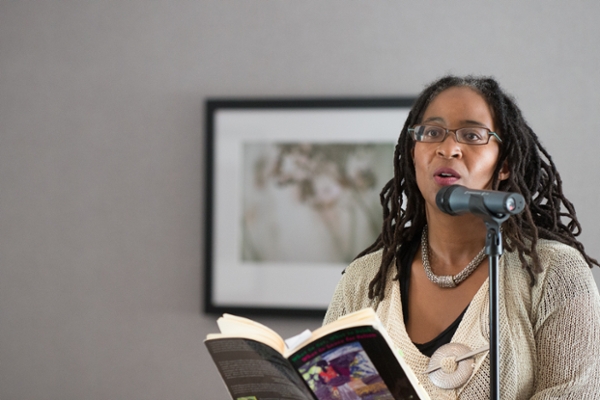"What I know about writing:" Camille Dungy on the hard work of transformation
News
Published in the summer 2014 Virginia Quarterly Review, Camille Dungy’s essay “A Brief History of Near and Actual Losses” narrates her experience visiting Cape Coast Castle in Ghana, where thousands were held before being loaded on ships to make the deadly Middle Passage. When asked what she thought of her visit, she replies, “Honestly, I don’t know what to think.”
The essay gives no easy answers, pat revelations, or false closure. As in her poetry, the essay creates a space for the reader to explore and question our troubled past and imperiled present. In her review of Dungy’s third collection of poetry Smith Blue, Molly Spencer of Flycatcher writes, “It’s … a survival guide for those of us who wish to navigate … contradictions deeply and well.”
The surety in Dungy’s poetry comes not from resolving contradictions but from her ceaseless attention to craft, which sustains readers through the difficult journeys her poems take. Suck on the Marrow travels through 19th-century Virginia and Philadelphia and is told in the voices of fugitive slaves, kidnapped Northern blacks, and free people of color. Remica L. Bingham-Risher writes in Obsidian, “Each piece of Dungy’s historical puzzle gives depth and life to those curtained and disappeared by unaware, uninterested, or obstinate gatekeepers.”
Dungy also confronts those “unaware, uninterested, or obstinate gatekeepers” as an editor. Her landmark anthology Black Nature: Four Centuries of African American Nature Poetry challenged received notions of what constitutes nature poetry and added important voices to the field. She is also the co-editor of From the Fishouse: An Anthology of Poems that Sing, Rhyme, Resound, Syncopate, Alliterate, and Just Plain Sound Great.
In an interview with Lunch Ticket, she remarked, “So why not use my poetry to try and make true that this world can be a better place? Why not use my poetry to try and make people uncomfortable with how things are so that they can move towards trying to change things towards something better?”
A professor in the English Department at Colorado State University, Dungy is a two-time recipient of the Northern California Book Award, has twice been nominated for an NAACP Image award, and was a finalist for the Balcones Prize. The Culture Trip recently named her one of the “10 Young American Poets Changing the Face of Poetry.”
In this three-part interview conducted by The Fight & the Fiddle editor Elizabeth Hoover, Dungy talks about how her processes as a poet, editor, and essayist are invested in transformation.
What do you love in a poem? | Dungy explains how editing Black Nature articulated her vision of nature poetry, how editing informs her own writing, and what it means to fall in love with a poem.
Transforming Form | Dungy describes how her willingness to push herself with rigorous—but also mundane—formal exercises leads to epiphanies and what poets’ “mutations” of received form contribute to the poetic tradition.
The Form the Essay Takes | Dungy discusses her new essay project’s relationship to form, the possibilities and pitfalls of writing about historical atrocities, and how the poetry of witness must join the past and present.
